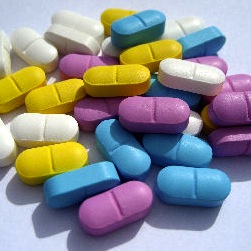Table of Contents
Prescription weight loss medications can sometimes help people to achieve modest weight loss. The weight loss medication Qnexa, for example, may help obese people lose about 10 percent of their total weight, when they use the drug alongside a reasonable diet and exercise program, according to USA Today. The idea of weight loss in a pill can be attractive to some people, and they may hope that their doctors will assist them in their quest to live a healthier life through pharmacology. However, some people who don’t need to lose weight may still feel the need to drop a pound or two, and they may also be attracted to the idea of taking a pill instead of restricting their food or sweating the pounds away. If these users lean on over-the-counter diet pills, they could develop dangerous addictions in the process.
Common Diet Pills in Stores
There are hundreds of thousands of products sold in drugstores and vitamin shops that claim to boost the metabolism and help people to slim down and shape up. According to the Mayo Clinic, these are some of the products a shopper can find in a store:
- Bitter orange
- Chitosan
- Chromium
- Conjugated linoleic acid
- Green tea extract
- Guar gum
- Hoodia
While the manufacturers of these products claim they work, the Mayo Clinic reports that most of these products are “probably ineffective,” or that there isn’t enough evidence to prove that they either are or are not effective. In other words, those who believe these drugs can help them to lose weight may not find any assistance at all.
Diet Pills Online
 If users open up computer browsers and look for diet pills online, they may find an amazing amount of products that can be shipped directly from the manufacturer to their homes, and all of these products can supposedly help to burn fat and reduce weight. Some of these products may do nothing at all, but others may contain ingredients that can help a person to melt away unwanted pounds. Unfortunately, the products that can be effective tend to bring about their results because they contain dangerous ingredients.Diet pills sold online are often structurally similar to the illicit drug amphetamine. This drug seems to speed up metabolism, and it can reduce sensations of hunger. People who take these drugs are burning calories at a faster rate, and they’re not interested in replacing those calories with more food. These drugs can also be rewarding to the mind, as they can cause a surge in the chemicals the brain typically releases in response to pleasure. In time, people can become addicted to the pleasure, and their brains can develop subtle damage that can lead to the compulsive use and misuse of drugs. They might be simply unable to stop their use, even though they might want to do so.
If users open up computer browsers and look for diet pills online, they may find an amazing amount of products that can be shipped directly from the manufacturer to their homes, and all of these products can supposedly help to burn fat and reduce weight. Some of these products may do nothing at all, but others may contain ingredients that can help a person to melt away unwanted pounds. Unfortunately, the products that can be effective tend to bring about their results because they contain dangerous ingredients.Diet pills sold online are often structurally similar to the illicit drug amphetamine. This drug seems to speed up metabolism, and it can reduce sensations of hunger. People who take these drugs are burning calories at a faster rate, and they’re not interested in replacing those calories with more food. These drugs can also be rewarding to the mind, as they can cause a surge in the chemicals the brain typically releases in response to pleasure. In time, people can become addicted to the pleasure, and their brains can develop subtle damage that can lead to the compulsive use and misuse of drugs. They might be simply unable to stop their use, even though they might want to do so.
It’s hard for users to protect themselves from this kind of damage, as the manufacturers of these drugs are rarely open and honest about the ingredients they use in their drug cocktails. For example, in an article in the American Journal on Addictions, researchers outline the case of a woman who believed she was taking a basic diet pill. Instead, she was taking pills laced with an amphetamine-like drug, along with an antidepressant. These aren’t the ingredients the woman wanted, and yet, they were the ingredients found in her drugs.
The Dangers
It’s hard to know exactly how dangerous weight loss pills can be, as they all have different ingredients and they work in different ways within the body. However, experts at the Palo Alto Medical Foundation suggest that many weight loss products work by stimulating the central nervous system, speeding up the body’s processes in such a way that weight loss is the likely result. Other weight loss products contain diuretics that can cause the body to shed the pounds it holds as a result of water. These ingredients can cause a variety of problems, including:
- Dehydration
- High blood pressure
- Irregular heart beat
- Nervousness
- Seizures
- Insomnia
These diet pills can also be traumatic and dangerous for people who have an underlying anorexia or bulimia issue. The pills seem to provide these people with yet another avenue they can use in order to keep their weight down and the pounds away, and the drugs may feed into their need for control. People who have these disorders may also face increasing health risks due to diet supplements, as the damage of low weight can sometimes mirror the damage caused by diet pills. People who have anorexia, for example, may experience heart damage due to low electrolyte levels and poor nutrition. If these people experience a galloping heart rate due to diet pills, they may have a fatal heart attack.
A Common Problem
The use of diet pills might seem strange or even a little bit unusual, but it’s a common practice among young people who want to lose weight. For example, a study in the journal Health Psychology found that young, female smokers were more likely than non-smokers to use diet pills, and that these young people were also likely to use the illicit amphetamines in order to lose weight. These young people were savvy about how pharmaceuticals could help them to shed pounds, and they were more than happy to outline what they had taken. It’s quite possible, however, that they had no idea about the damage these substances could cause.
In a separate study in the International Journal of Eating Disorders, researchers found that of those who had used herbal remedies for weight loss, 41 percent knew nothing about them. Even though they had used the products, they couldn’t describe how the products worked or what sorts of side effects the drugs could cause. They were just taking these medications, and they weren’t really thinking through the consequences. Perhaps if these young people learned more about the substances they were taking, they’d be less likely to pop a pill in pursuit of a perfect body.
Help Needed
 Weight loss pills that contain amphetamine or amphetamine-like ingredients may be difficult for users to avoid on their own. These drugs can cause chemical amendments inside the brain that lead to compulsive use, and they aren’t the sorts of changes a user can just ignore or wish away. A treatment program can make a huge difference, but users will need assistance in order to stop abusing those drugs so they can participate in therapy and learn how to keep their drug use under control.
Weight loss pills that contain amphetamine or amphetamine-like ingredients may be difficult for users to avoid on their own. These drugs can cause chemical amendments inside the brain that lead to compulsive use, and they aren’t the sorts of changes a user can just ignore or wish away. A treatment program can make a huge difference, but users will need assistance in order to stop abusing those drugs so they can participate in therapy and learn how to keep their drug use under control.
Other diet pills may not contain addictive ingredients, but the behaviors that underlie the use of these drugs might best be resolved with therapy. People who have eating disorders, for example, might need to learn how to find control in life without using the shape and size of their bodies as a weapon. Those who have low self-esteem might need to learn how to express their opinions and find their inner beauty, without leaning on diets and superficial appearance in the process. And those who find that pills are an effective way to handle life’s challenges and disappointments might benefit from therapies that teach them about the nature of addiction, and why it can be so very deadly.
At Axis, we specialize in developing customized treatment programs that are based on the problems clients have now, and the results they’d like to see in the future. We spend a significant amount of time talking to, testing and learning about our clients, so we can develop intense programs that can help. With this approach, we can make a big difference in the lives of people who have mental health or addiction issues. If you’d like to find out more about how our enrollment process works, please call.


